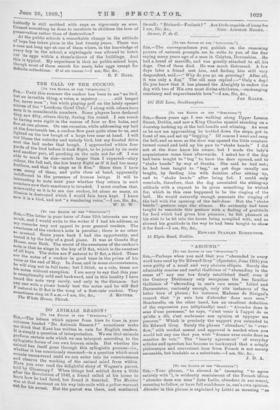" ABOUND."
[To THE EDITOR Or THE " srxervron.1 SIR, —Perhaps when you said that you " abounded in every word hero used by Sir Edward Grey" (Spectator, June 1201) you were guilty of a small and very obvious ellipsis. Surely the admirably concise and useful Gallicism of "abounding in the sense of" any one has firmly established itself, even if the Century Dictionary only recognises the less familiar Gallicism of "abounding in one's own sense." Littre and Darmesteter, curiously enough, only cite instances of the latter turn of phrase ; for instance, Madame do Sevigu6', remark that " je suis loin d'abonder dans mon seas." Bescherelle, on the other band, hits an excellent definition of the expression you (elliptically) used : " Abonder dans he sens d'une personne," he says, " &est venir ii l'appui de ce qu'elhe at dit, c'est embrasser son opinion et appuyer see preuves." Which is precisely the support you extended to Sir Edward Grey. Surely the phrase " abundare," to " over- flow," with cordial assent and approval is needed when you would tell any one that you wish "donner avec execs dans sa manure do your." The " hearty agreement" of everyday articles and speeches has become so hackneyed that a crisply picturesque and convenient loan from French is not merely excusable, but laudable as a substitute.—I am, Sir, &c., J. D. A.


























































 Previous page
Previous page